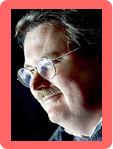Simon Longstaff:
Our Community: What are the three attributes you would consider to be essential to a leader? Simon Longstaff: Moral courage is the first. It's the ability- in whatever role you happen to occupy - to stand true to the things that you believe to be right and good. That's what ultimately inspires all people I think more than anything else. The ability to be reflective and to do so to escape the chains of unthinking custom or practice. Truly great leaders are constructively subversive individuals who refuse to accept the world as it is given to them and refuse to accept or take established patterns of behaviour and systems and structures and instead ask "why" and ties them back to some deeper structures or principle which allows for evolution or revolution to take place. I don't know what the words are to describe this but I think great leaders are able to sense on three levels. They have the ability to hop in the helicopter and see the overall picture while simultaneously being in the submarine and picking up the undercurrents and they are also able to live there in the moment as well. They operate on three levels but they do it simultaneously - they have the overview, they pick up the subtle undercurrents and they get a feel for the moment. Our Community: What are the three greatest barriers to new leaders emerging in Australia? Simon Longstaff:
Our Community: What advice would you give to a potential leader to take them to the next stage? Simon Longstaff: Just ask why. It's the notion of the constructive subversive - to be prepared to ask why. If it seems wrong, challenge it. Don't be afraid to challenge or to change. Our Community: Nature/nurture - are leaders born or bred? Simon Longstaff: They are not born. There's the big capital L leaders that occupy roles which gives them status as a leader and then you have countless people who are leaders that may never have a formal position. I don't think even think the Capital L leaders are born to lead. I think they grow into a role and people that other people most admire often find themselves suddenly in a position where they have to take up the mantle of leadership and they grow into it. Some extraordinary individuals just pull themselves up entirely from their own bootstraps. I do think it is something which you can prepare yourself to do. Our Community: What do you consider to be the three top leadership issues facing the nation? Simon Longstaff:
Our Community: What insights have you gained personally on your leadership journey? Simon Longstaff: Don't take yourself too seriously. There's clearly a moment when your own resolve and relying on your own self confidence is important but that's very different to poncing around and expecting yourself to be universally admired. Our Community: Who have been your own leadership mentors and how did they assist in developing your own leadership style? Simon Longstaff: It sounds like a real cop-out but there have been so many different people and that's the truth. I find I pick up clues from different people. Sometimes they can be very large ones but I have not had the one person who has been an overwhelming influence. It's a case of lots and lots of people in so many different ways. Published November 2005
|

